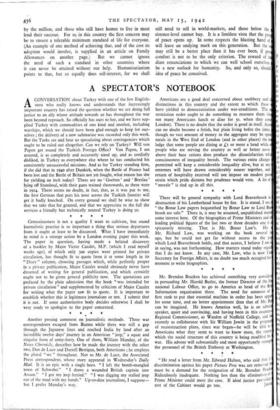Another passing comment on journalistic methods. Three war correspondents escaped
from Burma while there was still a gap through the Japanese lines and reached India by land after an incredible twelve days' journey in an American " jeep," a squat and singular form of army-lorry. One of them, William Munday, of the News Chronicle, describes how he made the journey with the other two, Dan de Luce and Darrell Berrigan, both Americans ; he employs the plural " we " throughout. Not so Mr. de Luce, the Associated Press correspondent, whose story appeared in Wednesday's Daily Mail. It is an epic with a single hero. " I left the bomb-mangled town of Schwebo." " I drove a wounded British captain into Assam." " I got my jeep ferried." " I was digging my stalled jeep out of the mud with my hands." Up-to-date journalism, I suppose— but I prefer Munday's way.
Americans are a good deal concerned about snobbery and distinctions in this country and the extent to which these have yielded to democratisation under war-conditions. The restriction order ought to do something to reassure them not many Americans lunch or dine for 5s. when they corn London). There is no doubt that the order is good in itself. Aust can no doubt become a fetish, but plain living befits the times, though no vast amount of money in the aggregate may be spen meals in the West End of London (and in other places) the ledge that some people are dining at LI or more a head while people who are serving the country as well or better never above their base rations does produce the dissatisfaction whi consciousness of inequality breeds. The various extra charge' permitted will keep a considerable inequality alive, but at any extremes will have drawn considerably nearer together, and return of hospitality received will not impose on modest pur, strain which pride dictates but prudence would veto. A lot of " morale " is tied up in all this.
• * * *


























 Previous page
Previous page